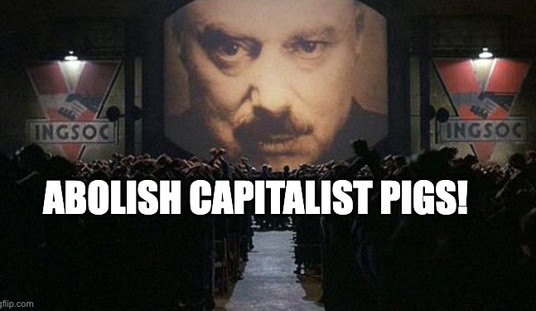And when the Wall Street Journal complains of corporate welfare via regulatory expansion, it’s worth noting. In an editorial today scolding the GOP for playing ball on S510, the food-safety bill that Harry Reid pushed as part of his desperate lame-duck agenda, the WSJ’s editors notes that the expansion of FDA powers and especially its mandatory recall authority will disproportionately impact smaller growers, especially in the House version, which is why the larger corporations didn’t put up much of a fight (via The Week):
The Senate waved through the largest expansion of food regulation since FDR on Tuesday, 73 to 25, and maybe the bill won the votes of 13 Republicans because there was hardly any public controversy. These days, the government needs to take over entire industries to get anyone to notice.
Not that this bill in the name of food safety isn’t a down payment. The Food and Drug Administration will gain new powers over the 2.2 million farms and 28,000 food producers in America—including federal standards for agricultural practices and food processing, transportation and storage—as well as the authority to mandate nationwide recalls. …
Not surprisingly, this bill’s main critics have been the small farms and local and organic food outfits that don’t have the profit margins to comply with new regulatory burdens like the “risk-based preventative controls” that the FDA will soon enforce. The House version applies even to farmers markets and roadside stands. Naturally, agribusiness and the processed food industry (and their legal departments) couldn’t be happier, and it’s not the first time big business has leveraged government to weigh down smaller competitors.
That is a well-traveled road for larger companies. Licensing and regulatory oversight always tends to benefit those organizations that can spread compliance costs across a larger sales base. Large companies usually back these kinds of regulatory expansions and licensing requirements for that very reason. It eliminates competition and allows the larger players opportunity to either buy out or overwhelm smaller players.
The federal government has a legitimate role to play in food safety. Almost all agriculture crosses state lines, where state-based safety protocols may or may not exist outside of the FDA, and the consuming state would have little power to enforce those laws on producers. Having a patchwork of 50 state regulatory regimes (or less) with scant ability by consumers to affect safety could result in nasty interstate economic wars, which was the very outcome the Commerce Clause was intended to prevent. It may be abused in other ways, but food safety and having a single set of standards and enforcement on safety protocols on agriculture fits within a rational reading of the Constitution.
That doesn’t mean that the FDA should exceed what is necessary to ensure reasonable food safety. As Cato’s Walter Olson argues, the current system has worked to improve food safety already, which means we don’t need a larger regulatory effort (via the Boss Emeritus):
The wider question is whether the bill as a whole, with its massive ramp-up of federal regulation to displace both voluntary market choices and state-level regulation, is a good idea. As I observed to TownHall’s Jillian Bandes, despite the panic atmosphere generated over the issue in recent years, the best evidence is that the incidence of food poisoning continues to fall, not rise; one reason for the greater press coverage of the issue is that science has gotten better at identifying and tracing the sorts of outbreaks that were happening all along. To some who promote a more intensive regulatory state, the resulting “crisis” presents a welcome opportunity, even though, on these advocates’ own terms, the existing array of laws provides ample means by which federal agencies can crack down on food actually shown to pose a hazard.
When the new Congress convenes in January, it will bring to Washington dozens of new lawmakers with more skeptical views about regulation, who may listen with favor to colleagues like Sen. Tom Coburn (R-Okla.), who has argued against the pending FSMA as an unjustified power grab. Could that be why Sen. Harry Reid (D-Nev.) is determined to force through the bill during the lame duck session? In this case — as with the very bad Paycheck Fairness Act, which Republicans managed to stop earlier this month, and the even more appalling “Public Safety Employer-Employee Cooperation Act” to force unionization on local public safety workers — it’s almost as if the point of the post-election session is to push controversial measures that would encounter more resistance if held over to the next Congress. Is this really a proper use of the lame duck?
The WSJ also notes in its editorial that food-borne illnesses have dropped over the past decade by more than a third. Our food supply is among the safest in the world (and might be even safer if people got over an irrational fear of irradiation) and is getting safer. Precisely because these outbreaks are becoming more rare, they also become more noteworthy, garnering headlines that obscure the already-extant reliability of the food industry.
Regulatory regimes in a free market require balance to protect consumers while encouraging production, and should not put government in the position of skewing markets to pick winners and losers. This new bill upends a balance that is already working well and threatens to punish smaller players disproportionately. This debate should be extended instead of rushed through a lame-duck session, especially when higher priorities like passing a budget need more attention.








Join the conversation as a VIP Member